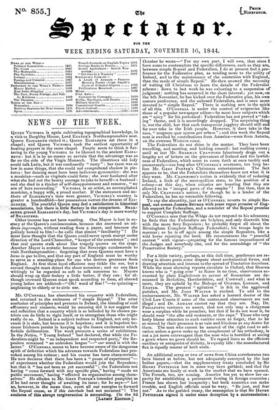Mr. O'CONNELL has abandoned his coquetry with Federalism, and returned
to the embraces of " simple Repeal." The utter confusion of principles and pretexts in Ireland, the blending of cool .effrontery and niaiserie, would be amusing did it not suggest the sad reflection that a country which is so befooled by its chosen pa- triots can do little to right itself, or to strengthen those who might really do so. Ireland is a subject tedious in England, not only be- cause it is stale, but because it is hopeless; and it is hopeless be- cause Irishmen persist in keeping up the insane excitement which forbids deliberation. The week presents a series of exhibitions. • In the Nation, "Young Ireland" had declared, that while the Fe- .deralists might be "an independent and respected party," the Re- peelers remained "an unbroken league"—" our stand is with the latter." O'Corossu, seems to have become aware of the dangerous spirit of defection which his advances towards Federalism had pro- voked among his retinue ; and his course has been characteristic. He now declares that there has been a "pause of experiment "- of experiment whether the Federalists would join the Repealers; but that it " has not been as yet successful" ; the Federalists not having "come forward with any specific plan," having "made no " public movement," having "effected no organization among them- selves." He alludes to Mr. GREY PORTER'S intended pamphlet as if he had never thought of awaiting its issue; for he says—" Let us, however, in the mean time, exert all our energies to forward the Repeal cause, as if this interlude had not occurred"! The .coolness of this abrupt tergiversation is astounding. On the 2d October he wrote—" For my own part, I will own, that since I have come to contemplate the specific differences, such as they are, between simple Repeal and Federalism, I do at present feel a pre- ference for the Federative plan, as tending more to the utility of Ireland, and to the maintenance of the connexion with England; than the mode of simple Repeal." He then avowed the necessity of waiting till Christmas to learn the details of the Federalist scheme : down to last week he was exhorting to a suspension of judgment : nothing has occurred in the short interval ; yet now, on the 8th November, he has kicked over the Federative plan, his own mature preference, and the unheard Federalists, and is once more devoted to " simple Repeal." There is nothing new in the spirit of all this. O'CONNELL is under the control of exigencies like those of a popular newspaper editor—he must have subjects which are" spicy" for his periodical : Federalism has not proved a " tak- ing" theme, and it is accordingly dropped. The surprising thing is, not the shift, but that such transparent jugglery should still and for ever take in the Irish people. However, it does take in the race, "magnum quw sparsa per (wheat"; and this week the Repeal rent is swelled by contributions from America—even from Astoria, on the extreme 'Western coast.
The Federalists do not shine in the matter. They have been travelling, and meeting, and holding council : but nothing comes; until at last Mr. SHARMAN CRAWFORD laboriously drags out a lengthy set of letters on the grievances of Ireland and the lawful- ness of Federalism, which seem to come forth at once tardily and prematurely—too long after O'CoNNELL's overtures, too long be- fore Mr. GREY PORTER'S Christmas entertainment. The fact appears to be, that the Federalists themselves know not what it is they want. Mr. Caewroao's notion is evidently that of reducing Ireland, a limb of the metropolitan state, to the position of a colony—at this day, when colonies are boasting that they are allowed to be "integral parts of the empire" ! But then, that is only Mr. CRAWFORD'S notion ; for though he is a leader of the Federalists, he has no ostensible following.
To cap the absurdity, just as O'CONNELL reverts to simple Re- peal, out comes JOSEPH STURGE with some vague promise of Eng- lish support for Federalism, and a reminder of the Repeal promise to support Complete Suffrage. O'CONNELL sees that the Whigs do not respond to his advances; he finds that the Federalists are helpless, and only discredit him with the more fiery Repeaters; he probably forgot all about the Birmingham Complete Suffrage Federalists; his troops begin to murmur; so he is off again among the simple Repealers, like a wild horse rejoining the herd. He recommences the " peaceful contest " with vigour—preparing for the famous impeachment of the Judges and somebody else, and for the assemblage of " the Preservative Society."


























